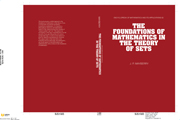6 - The Axiomatic Method
from Part Three - Cantorian Set Theory
Published online by Cambridge University Press: 05 March 2012
Summary
Mathematics before the advent of the axiomatic method
Up to now I have been treating set theory as the general theory of finite pluralities and my central preoccupation has been with the concept of finiteness, for that is what lies behind the basic principles. Now that the theory, in its Cantorian version, is in place, I can turn to consider its central role in mathematics as a foundation for the modern axiomatic method. But let me begin with some observations on the older approach to mathematics that the modern axiomatic method has supplanted.
Before the advent of modern axiomatics mathematicians were happy to call upon what they fancied to be their capacity for creative abstraction. Newton, as we have already seen, denned numbers as “abstracted ratios of concrete quantities”. This is somewhat mysterious, since ratios are not things, but relations between things, a difficulty already pointed out by Newton's predecessor, Isaac Barrow.
In Lecture XX of his Lucasian lectures, which bears the title That Reasons (i.e. ratios) are not Quantities, Barrow, after first apologising for entering “upon a Thing so subtle and intricate, which, either by the Nature of the Thing, or thro' the Fault of those that treat of it, is involved in a most thick Mist”, goes on to explain why he rejects views similiar to those that Newton was later to adopt.
- Type
- Chapter
- Information
- The Foundations of Mathematics in the Theory of Sets , pp. 191 - 236Publisher: Cambridge University PressPrint publication year: 2001

